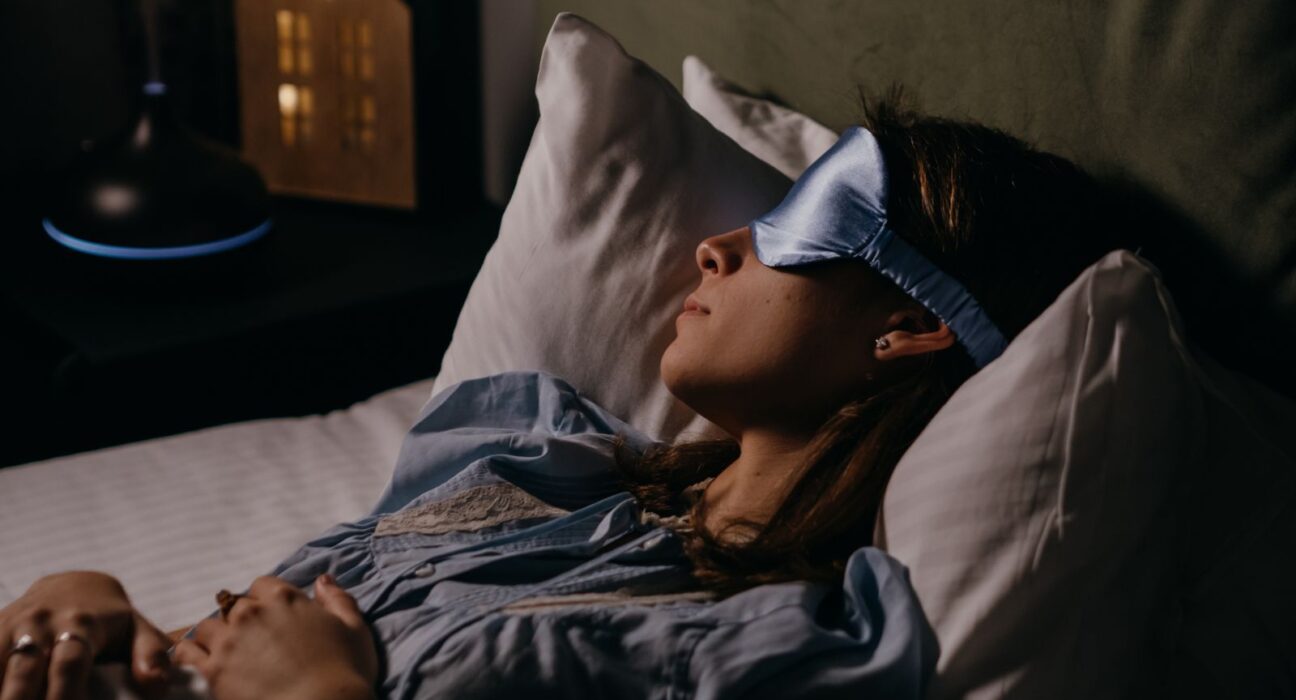Outline: Why Sleep? | Tips for a Good Night’s Sleep – Schedule – Bright Light – Food and Drink – Limit Naps – Exercise – De-stress – Supplements – Temperature – Bath – Clear Head – Specialist | Final Thoughts
Sleep is as vital to your health as diet and exercise. Getting enough quality or good night’s sleep regularly will help you feel more alert, refreshed, and ready to tackle everyday challenges.
But what exactly does “quality” sleep mean? And how can you increase the amount of time you spend sleeping each night?
In this article, we delve into your biggest questions about sleep, why sleep is important to overall health, and 5 tips on how to ensure you’re getting enough of it.
Why Is Sleep Important?
In short, we need sleep because our bodies need rest. We spend most of our lives awake and active, so when we finally go to sleep after a long day at work or school, it helps us recover from everything that happened during the day.
If we don’t get enough sleep at night (less than six hours) that our bodies need to function well, we become irritable and moody during the day.
Sleep deprivation also causes us to make mistakes more often at work or school. Things like leaving things behind or forgetting details about what happened yesterday are signs that you need more sleep.
Chronic sleep deprivation can lead to high blood pressure, diabetes, heart attack, obesity, depression, and other problems. Check out our article on how good sleep helps with weight loss.
And over time, a lack of sleep can even impact your appearance, causing premature wrinkling, dark undereye circles, and a spike in cortisol, the stress hormone.
11 Tips for Getting a Good Night’s Sleep
Most adults need at least seven hours of sleep per night for optimal health. But it’s not just about total hours — it’s also about quality and consistency.
Getting enough sleep every night is key to being well-rested, alert, and productive during the day. Here are 11 tips to help you catch up with more quality zzzs.
1. Stick to a Schedule
Sleep experts recommend going to bed and waking up at the same time daily. The body needs regular habits to regulate its circadian rhythm (the internal clock that regulates sleep).
If you don’t have a regular bedtime, your body becomes confused about when it should feel tired or be awake.
For most people, it’s helpful to put some kind of bedtime routine in place to assist with sticking to a schedule. Make sure your bedroom is dark and quiet for optimal sleep, and eliminate distractions and blue light sources such as TVs, laptops, and smartphones from the room entirely (or at least from within arm’s reach).
A set routine helps you wind down, creates a peaceful environment, and prepares you for a good night’s rest. Of course, better sleep is elusive if you end up on a social media spree or watching an action flick.
2. Get Bright Light Exposure
Speaking of circadian rhythms, exposure to outdoor light helps with its regulation. Bright light from natural sources is a powerful cue for the brain; it tells your body that it’s daytime and you need to be awake.
Indeed, light is one of the most powerful environmental cues that influence our circadian rhythms, which respond to light by producing melatonin. This hormone helps us sleep and regulate other biological functions.
3. Watch What You Eat and Drink
Be mindful of what you eat and drink before bed, as ingesting the wrong foods and liquids can cause digestive issues like bloating and heartburn, which can keep you awake at night.
Moreover, some foods can disrupt your sleep cycle because they contain stimulants like caffeine. Also, avoid alcohol before bedtime; while it might initially help you fall asleep, it can increase nighttime awakenings and decrease total sleep time.
However, not all foods are bad for sleep. Some foods like lavender or chamomile tea promote healthy digestion and help you fall asleep faster.
Just be sure to avoid liquids when it’s too close to bedtime to avoid using the restroom in the middle of the night.
4. Limit Daytime Napping
Short naps of 30 minutes or less can help refresh you and improve your alertness. But don’t nap late in the day or longer than an hour because it may interfere with your nighttime sleep.
Asides from disrupting circadian rhythms, longer naps taken later in the day may also cause sleep inertia – grogginess after waking up from a deep slumber.
Napping for shorter periods allows you to squeeze in a few extra z’s without grogginess, impaired cognitive ability, a desire to fall back asleep, and other symptoms of sleep inertia. You’ll also fall asleep faster at bedtime with shorter naps.
5. Exercise During the Day
One of the most common reasons people have trouble sleeping is because they don’t exercise enough during the day.
Exercises help you sleep faster and more soundly through the night. It can also help reduce stress, another reason people have trouble sleeping.
Though exercise helps promote better sleep, exercising too late in the day or right after work causes sleep issues at night.
If that’s you, try exercising earlier in the day instead, or at least do your workout earlier than usual so you can get a full night’s rest afterward.
6. Practice Stress Management
Stress is a normal part of life caused by significant events like illnesses, relationship problems, or financial difficulties.
It also comes from everyday hassles like traffic jams, work deadlines, and bills. However, regardless of the cause, stress leaves you feeling anxious, irritable, and physically tense.
If you ignore stress, it builds up till it becomes overwhelming and affects your ability to fall and stay asleep. Therefore, it’s best to find ways to manage your stress levels; this will help relax you when it’s bedtime.
In addition to daytime exercises, take time to relax. Use relaxation techniques such as meditation or deep breathing to calm your mind and body before bedtime.
Related Read: How to Manage Stress and Anxiety with Positive Affirmations
7. Try Supplements

You can get a good night’s sleep by taking supplements. Although our bodies naturally produce melatonin, it can be taken as a supplement to enhance sleep.
Melatonin supplements are especially helpful if you have trouble sleeping because of jet lag, stress, anxiety, or insomnia. While melatonin is considered safe, it’s best to check with your doctor for the correct dose, lest you come down with daytime drowsiness.
Other supplements that may help with sleep include the following (again, check with your doctor first, especially if you take other medications):
- Ginkgo biloba: This natural herb can aid sleep, promote relaxation, and reduce stress.
- Glycine: Some studies suggest that taking the amino acid glycine can help to boost sleep quality.
- Valerian root: Valerian may likewise help you fall asleep faster and improve the quality of your sleep.
- Magnesium: Every cell in your body contains magnesium, and it helps promote relaxation and sleep quality.
- L-theanine: The amino acid L-theanine also improves relaxation and sleep.
8. Check Your Bedroom’s Temperature
The National Sleep Foundation says a cool room is one most important factor in getting a good night’s rest. Ideally, your bedroom should be about 65 Fahrenheit (18 degrees Celsius).
If you aren’t comfortable at night, it may be that your room is too hot or cold. Here are some ways to keep your bedroom at the perfect temperature:
- Check your thermostat. Does it need to be adjusted? Is it functioning properly, and are the readings accurate? Call in a technician to double-check if you’re in doubt.
- Set a fan next to your bed or turn on a ceiling fan. Fans help circulate air throughout a room and can help keep you cool as you sleep – you certainly won’t wake up drenched in sweat.
- Open windows if possible.
9. Take a Bath or Shower
It can be hard to fall asleep when stressed out, so take a relaxing bath or shower before bedtime. The warmth of the water can help you relax and wind down, making it easier to fall asleep.
Aim to take your bath or shower around 90 minutes before bedtime to promote deep sleep and high sleep quality. If you’d rather not get in the tub before bed, you can soak your feet in warm water to help you relax.
10. Clear Your Mind
Feeling burdened by your thoughts while in bed? Then get a book and write down everything on your mind. This practice helps clear your mind, making it easier for your brain to shut down naturally.
Writing about your thoughts and feelings can help you process them, and may reduce stress or emotional arousal.
On the flip side, if you tend to lay awake thinking about everything you have to get done the next day, putting it down on paper does help.
If it helps, you can also create a to-do list for the next day to help prioritize your responsibilities. You also get a clearer picture of what needs to get done the next day when you wake up.
11. See a Specialist
Don’t be afraid to see a sleep specialist because you may have an underlying sleep disorder. Sleep specialists can help identify and treat the underlying cause of your insomnia.
As trained experts in medicine and behavioral therapies, they can prescribe medication or offer counseling, depending on what works best for you.
There are different types of sleep disorders:
Sleep Apnea
If you stop breathing for short periods during sleep, you might have obstructive sleep apnea (OSA). OSA happens when the throat muscles relax and block the airway, causing disrupted breathing patterns that prevent normal sleep.
According to the National Sleep Foundation, OSA is a common yet treatable and severe condition that requires intervention.
Restless Legs Syndrome (RLS)
Many people with RLS experience uncomfortable leg sensations that make it hard to fall or stay asleep. The discomfort usually starts when you first lie down but often gets worse as the night goes on, making falling asleep harder than ever before — even if you’re physically exhausted!
Narcolepsy
This condition is characterized by overwhelming daytime drowsiness and sudden uncontrollable episodes of falling asleep during routine daily activities like eating, talking, or walking.
Final Thoughts
The tips discussed above are relatively easy to follow, but sometimes old habits get in the way of sticking to a new sleep routine.
Remember, a good night’s sleep is essential for optimal health, and overworking yourself or staying up late is not a badge of honor.







